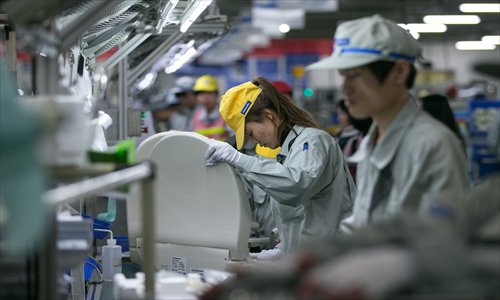Japanese investment in China drops sharply
Firms facing rising costs, stronger competition: MOFCOM

Staff work on toilet lids at Panasonic Home Appliances (Hangzhou) Co in East China's Zhejiang Province. Photo: CFP
Japanese direct investment in China dropped 25.1 percent year-on-year in the first 10 months this year, after declining 38.8 percent in 2014 on a yearly basis, the Ministry of Commerce (MOFCOM) said on Tuesday.
Over the last two years, Japan's direct investment in China has been on a downward trend, partly because of the external economic environment and also problems at Japanese enterprises, Shen Danyang, spokesman for MOFCOM said at a regular press conference on Tuesday.
The depreciation of the Japanese yen has made it more difficult for Japanese enterprises to expand their business in China, Shen said at the press conference.
Jin Baisong, a research fellow at the Chinese Academy of International Trade and Economic Cooperation, agreed with Shen. "The depreciation of the yen and appreciation of the yuan has made it costlier for Japanese companies to run their businesses in China," Jin told the Global Times on Tuesday.
This means that export-oriented Japanese companies are now less competitive in the Chinese market, Jin said.
Some Japanese companies have also adopted a wait-and-see attitude toward the Chinese market as they have some concerns over economic development in China, Shen said.
China's economy has entered a "new normal" period with slower economic growth, and labor and land use costs are still rising, Shen noted.
Japan has a long history of investing in China, and many Japanese companies set up branches in China years ago, but they are now facing intensified competition from domestic companies as well as firms from other countries, Shen noted, adding that some Japanese companies with lower technology have been forced out of the Chinese market.
The sharp drop in Japanese direct investment in China also partly reflects soured bilateral relations over territorial and wartime historical issues, Jin said, and this could continue to be "one of the factors limiting Japanese direct investment in China."
However, a reduction in some countries' direct investment in China is "a normal phenomenon" and simply a strategic adjustment when faced with rising costs, Chen Fengying, a research fellow with the China Institutes of Contemporary International Relations, told the Global Times on Tuesday.
"In the past, China gave some privileges such as tax breaks to foreign companies in order to attract their investment. But now, China is starting to treat domestic and foreign companies equally," Chen said.
Direct investment in China from the US also declined during the first 10 months, with a drop of 13.6 percent year-on-year, according to a statement released by MOFCOM on November 11.
However, investment from ASEAN, the European Union, and from countries and regions along the "Belt and Road" initiative continued to grow, MOFCOM said.
China still appears to be an attractive destination overall, with foreign direct investment into the Chinese mainland increasing 8.6 percent year-on-year to 639.42 billion yuan ($103.68 billion) in the first 10 months, according to MOFCOM.
But Chen also noted that Japanese companies will not give up on the Chinese market, adding that foreign investment in the domestic services and high-tech manufacturing sectors is growing strongly.
In the first 10 months, foreign investment in the domestic services sector increased 19.4 percent, and in the high-tech services sector it rose by 57.5 percent to $6.76 billion, according to MOFCOM
Most Japanese companies that have invested in China are eager to seek more profitable businesses, news portal people.com reported in September, citing a report released by the Japan External Trade Organization, a government-related organization aiming to promote trade and investment between Japan and other countries.
The Global Times tried to reach some Japanese companies with branches in China for comment, but got no response as of press time.
Meanwhile, 28 percent of 1,000 company executives based in 89 countries and regions still regard China as one of the best investment locations in the world, according to a report released by the United Nations Conference on Trade and Development in June this year.